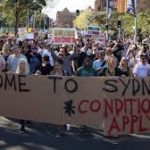Sydney: Australia’s Nanny State
From Sydney’s new lock out laws, smoking bans in all public spaces (including no smoking inside our prisons), to tougher bail laws, to speed cameras almost everywhere, to reduced speeding limits, senseless drug driving laws, and police body cameras, Sydney has turned into what many are calling a ‘nanny state.’ They lament how the city has become quite an international joke on the worldwide stage with all of its over policing and abundance of regulations.
Is the previous Gillard Government to blame?
Over the years Sydney has imposed more and more laws and regulations, encompassing a myriad of activities. Whether it is related to what people are consuming, where they are going, what they are doing, when they are doing it or even who they are doing it with; Sydney seems to have a law or regulation pertaining to just about anything. Frank Chung in his article in News.com.au says some people “contribute this to the former Gillard Government that claimed a measure of its success was the passing of more than 500 bills into legislation — or 21,000 additional regulations.”
Have the Lockout Laws gone way too far?
Take for example the lock out laws that the NSW Government introduced in 2014. They were put in place to cut down on late-night alcohol-fuelled violence. However, statistics released in June of last year show the number of “assaults outside licensed venues nearly doubled after the laws came into effect” (News.com.au).
Critics of Sydney’s over regulation claim that the city has gone way too far. Sydney’s CBD now has a 40km/hr. speed limit thanks to Transport for NSW’s effort to improve pedestrian safety. Speed cameras are absolutely everywhere. If a restaurant wants to get an outdoor dining permit they have to provide an excruciatingly detailed account of what they are going to do and where they are going to place every little item including the seats, tables, heaters, screens and even the umbrellas. It is worse still if they happen to want to serve alcohol.
Is telling people how to drive, what and where to eat, drink, smoke, and when to go to bed the role of police?
Over regulation is killing everything from Sydney’s night life and economy to its creativity and culture, and all under the premise of keeping its citizens safe. Safe from who, themselves?
This excessive regulation some feel is a knee jerk response to a few violent drunks that have made Sydney’s downtown look like a raucous road house full of hooligans. Others feel that all this over policing and tougher bail laws have led to the serious overcrowding in NSW jails. Whatever the result, Sydney’s ever increasing control is not good for business or the city’s morale. Many cite this ‘nanny state’ of affairs fundamentally undermines personal responsibility and is a serious breach of personal liberty.
What is the legitimate role of government?
Regulations and laws are an important aspect of civil society. They allow us to live together in relative harmony while at the same time allowing us some freedom of choice about how we live our lives.
The only time in which power should be exercised against an individual’s will, according to John Stuart Mill is to prevent harm to others.
Christopher Snowden in the Health Spectator suggests health activists want to “redefine” the concept of freedom. He uses the example of when an Australian Health Promotion Association (AHPA) spokesman told the nanny state inquiry that ‘to be truly free’ we need to be able to walk down the street ‘free from the fear of being run down by a speeding or drunk driver’ and without being ‘exposed to cigarette smoke’. What is notable about this definition of ‘true’ freedom is that it is all about being free from things rather than being free to do things.
As adults we understand our collective responsibility to one another. Chung in his article quotes Simon Breheny, editor of the Freedom Watch blog, as saying government “should trust us to learn from our mistakes and, in the process, make better decisions about our lives.” Breheny further adds that “Australians are smarter than politicians give us credit for” and “the nanny state isn’t just a niggling, annoying voice in the background — it’s a fundamental undermining of personal responsibility.”
Not only is trying “to influence decisions about alcohol or smoking or food choices that people make . . . an illegitimate role for government.” Breheny says, “every new law restricting choices that people can make adds to Australia’s regulatory burden, which can have an enormous effect on the economy.”
We should and can be a world class city like London, Berlin, Paris or New York.
Instead of having the fun police everywhere, why don’t we as urban planner Gollan suggests in Mashable, “create an urban culture of positive social behavior where violent drunks prefer not to hang out,” instead of one of excessive regulations.







